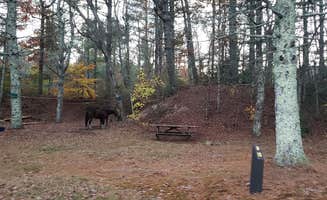Arcadia Management Area provides equestrian camping opportunities about 35 miles northwest of Portsmouth, Rhode Island. The terrain features forested trails through the 14,000-acre wilderness area with elevation changes ranging from 200 to 400 feet above sea level. Most equestrian camping areas in the region remain open from April through October, though weather conditions can extend or limit the actual usable season.
What to do
Trail riding access: LeGrand Reynolds Horsemen's Camping Area grants direct entry to Arcadia's multi-use trail system. The campground has "space your camping gear as well as a trailer and horseline," according to experienced riders who've stayed there. Trails connect to wider recreation areas throughout western Rhode Island.
Explore nearby state forests: Frog Hollow Horse Camp at Pachaug State Forest offers additional trail options about 40 miles away. "Three horseback riding loops leave from the campground. There's also fishing and hiking available in the forest," notes one rider who visited in late October when "about half the sites were occupied."
Swimming opportunities: When not riding, cool off in designated swimming areas. At Charge Pond Campground — Myles Standish State Forest, a camper reports "the pond water was very clear, seeing as they are fed from natural springs under the ponds." Most equestrian campgrounds maintain separate areas for horse bathing and human swimming.
What campers like
Spacious sites: Horse campers appreciate ample room at designated equestrian campgrounds. At Normandy Farms Campground, located about 35 miles from Portsmouth, reviewers note "campsites are big and well spaced" with many offering "paved patios while other sites are gravel."
Privacy between campsites: Unlike standard campgrounds, equestrian sites typically provide more separation. One camper at Myles Standish State Forest described "vegetation between sites for privacy," which helps reduce stress for both horses and riders during overnight stays.
Trail variety: Riders value the diverse terrain options. At Ponkapoag Camp, visitors mention "hiking trails abound on the property. While none of the trails are steep, they all go through beautiful areas." This variety allows riders to match trail difficulty to their horses' abilities and experience levels.
What you should know
Limited amenities: Most equestrian campgrounds prioritize trail access over conveniences. "This is NOT a quiet, restful place to stay to visit Boston and the surrounding area," notes one candid reviewer about Normandy Farms, highlighting the importance of researching each location's specific offerings.
Reservation requirements: During peak riding seasons (May-September), equestrian campsites fill quickly. LeGrand Reynolds requires advance booking, especially for weekend stays when many local riding clubs organize group camping trips.
Weather considerations: New England's variable conditions affect trail quality. At Wolf Den Campground — Mashamoquet Brook State Park, a visitor reported they "stayed here on a Tuesday night right after hurricane Henri. The park was completely cleaned up from any damage or debris, all in great shape," showing how quickly conditions can change.
Tips for camping with families
Check site layouts: Family-friendly equestrian sites need space for both horses and children. "Sites are large and shady but don't have water or electric. The bath houses are clean and accessible," reports one family at Myles Standish, noting the basic but functional amenities.
Plan alternative activities: Not everyone rides horses. Ponkapoag Camp offers options where "kids can hang out in the clubhouse if it's raining or swim in the pond if it's hot. Lots of hiking trails," providing activities for non-riders in your group.
Safety boundaries: Establish clear rules about approaching horses. Many campgrounds like The Preserve Club and Residences have designated horse areas separate from general camping spaces, creating what one visitor called "New England's most amenity rich properties" with safe zones for different activities.
Tips from RVers
Hookup availability: Check electrical requirements before booking. LeGrand Reynolds offers both 30-amp and 50-amp electrical hookups for horse trailers with living quarters, unlike many more primitive equestrian campgrounds.
Site leveling challenges: RV pads at equestrian campgrounds often require extra leveling. At Mashamoquet Brook State Park, "most sites are relatively short level pads, with little or no shade, but very pleasant," indicating preparation may be needed for larger rigs.
Access road conditions: Horse trailer access requires adequate roads. Reviewers at Normandy Farms note "roads are paved and plenty wide enough for big RVs to navigate," which is essential information when hauling horses to camping destinations near Portsmouth.


